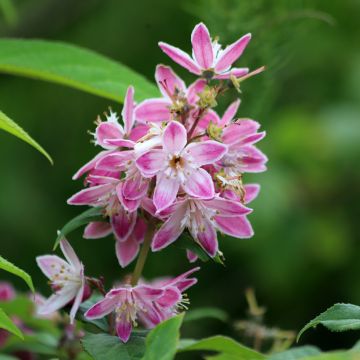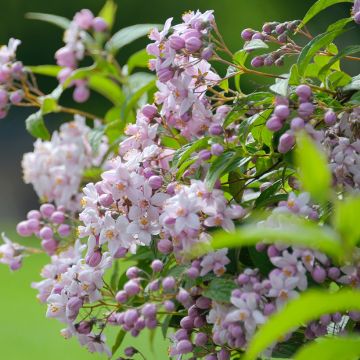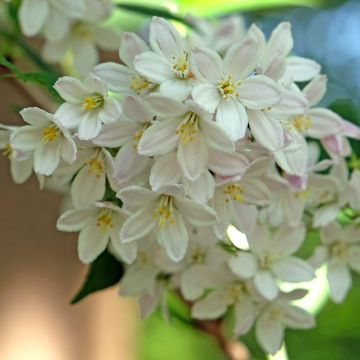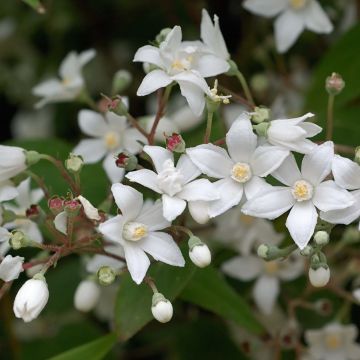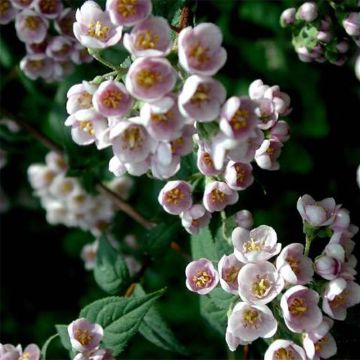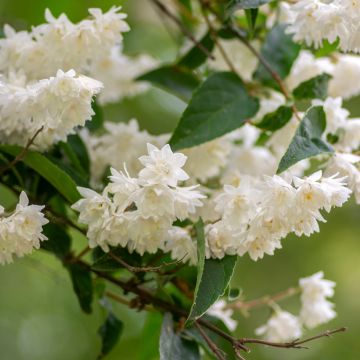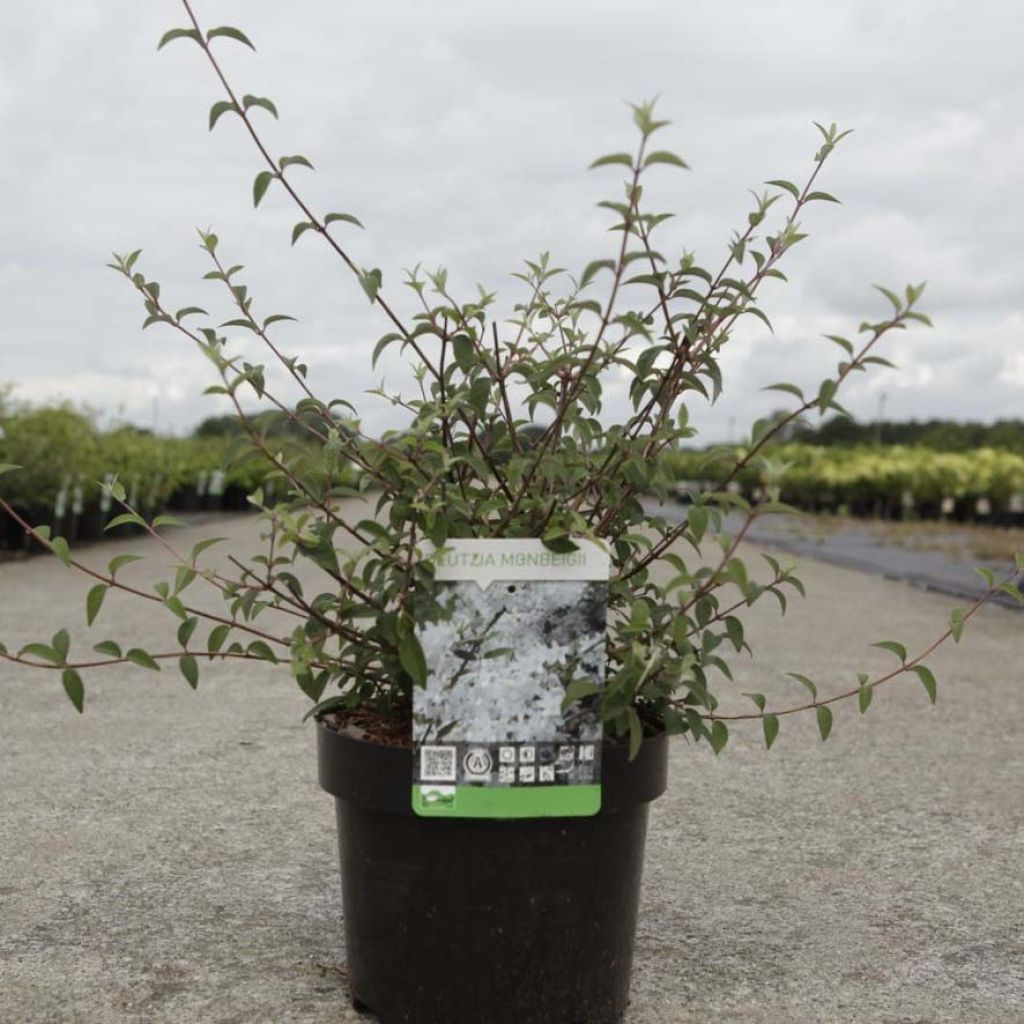

Deutzia monbeigii
Deutzia monbeigii
Deutzia monbeigii
Monbeigs Deutzia
Plant arrived with an unattractive shape. Not possible to put it with the others. Appreciated commercial gesture. We found another (unplanned) spot for it, which seems to suit it well.
Sabine, 21/03/2023
Special offer!
Receive a €20 voucher for any order over €90 (excluding delivery costs, credit notes, and plastic-free options)!
1- Add your favorite plants to your cart.
2- Once you have reached €90, confirm your order (you can even choose the delivery date!).
3- As soon as your order is shipped, you will receive an email containing your voucher code, valid for 3 months (90 days).
Your voucher is unique and can only be used once, for any order with a minimum value of €20, excluding delivery costs.
Can be combined with other current offers, non-divisible and non-refundable.
Home or relay delivery (depending on size and destination)
Schedule delivery date,
and select date in basket
This plant carries a 24 months recovery warranty
More information
We guarantee the quality of our plants for a full growing cycle, and will replace at our expense any plant that fails to recover under normal climatic and planting conditions.
Would this plant suit my garden?
Set up your Plantfit profile →
Description
Deutzia monbeigii is a species of deciduous deutzia forming a small bush and offering a profusion of clusters of simple star-shaped flowers, pure white with very visible golden yellow stamens from May to July! It has the same elegant natural habit with its upright and then trailing branches, and the same rapid growth that can be found in other species of the genus. It is distinguished notably by its reddish-brown young shoots and its small leaves with finely toothed margins and a dark green colour with a white underside. It is a versatile bush that can be used as a standalone plant, in a small informal hedge, as a border or in a mixed flowerbed with other flowering species. Perfectly hardy, it adapts to both full sun and partial shade and tolerates all soils as long as they are fertile, moist and deep.
Deutzia monbeigii is a species native to southwestern China which forms a small bush with an erect habit in its early years and spreads out with age. Its flexible branches slightly arch at their tips. Its cinnamon colour bark peels off in adulthood. With rapid growth, it reaches an average size of 1.5 m (4 ft 11 in) in all directions. The abundant flowering often starts in May and lasts a good part of June until July, almost hiding the foliage under the clusters of pure white, star-shaped flowers, with only 5 petals, fully open to reveal a heart of long golden yellow stamens. Its deciduous leaves are dark green, downy, and rough. The leaves are elongated oval to lanceolate shaped and measure only 1.20 to 2.5 cm (0.5 to 1 in) in length with finely toothed edges.
Deutzia monbeigii, just like its ancestors, is very hardy, but it dislikes drought and shallow soils. It is necessary to protect its beautiful flowering from scorching sun and strong winds. This very beautiful bush will find a place as a standalone plant in a small garden or in an informal, flowering, or mixed hedge, associated with other flowering shrubs with staggered flowering such as landscape shrub roses, buddleias, lilacs, mock oranges, spireas, flowering crabapples or other hawthorns. It also forms beautiful combinations with evergreen foliage such as conifers, Elaeagnus ebbingei, Photinia, Mexican orange trees...
Report an error about the product description
Deutzia monbeigii in pictures




Plant habit
Flowering
Foliage
Botanical data
Deutzia
monbeigii
Hydrangeaceae
Monbeigs Deutzia
China
Other Deutzia
View all →Planting and care
Deutzia monbeigii is accommodating in terms of soil and tolerates the presence of limestone, but prefers deep, moist, well-drained and humus-rich soils. It will appreciate a full sun or semi-shade exposure, sheltered from strong winds to protect its flowering. Pruning after flowering is recommended to clean it of all dead stems and floral branches.
Planting period
Intended location
Care
-
, onOrder confirmed
Reply from on Promesse de fleurs
Haven't found what you were looking for?
Hardiness is the lowest winter temperature a plant can endure without suffering serious damage or even dying. However, hardiness is affected by location (a sheltered area, such as a patio), protection (winter cover) and soil type (hardiness is improved by well-drained soil).

Photo Sharing Terms & Conditions
In order to encourage gardeners to interact and share their experiences, Promesse de fleurs offers various media enabling content to be uploaded onto its Site - in particular via the ‘Photo sharing’ module.
The User agrees to refrain from:
- Posting any content that is illegal, prejudicial, insulting, racist, inciteful to hatred, revisionist, contrary to public decency, that infringes on privacy or on the privacy rights of third parties, in particular the publicity rights of persons and goods, intellectual property rights, or the right to privacy.
- Submitting content on behalf of a third party;
- Impersonate the identity of a third party and/or publish any personal information about a third party;
In general, the User undertakes to refrain from any unethical behaviour.
All Content (in particular text, comments, files, images, photos, videos, creative works, etc.), which may be subject to property or intellectual property rights, image or other private rights, shall remain the property of the User, subject to the limited rights granted by the terms of the licence granted by Promesse de fleurs as stated below. Users are at liberty to publish or not to publish such Content on the Site, notably via the ‘Photo Sharing’ facility, and accept that this Content shall be made public and freely accessible, notably on the Internet.
Users further acknowledge, undertake to have ,and guarantee that they hold all necessary rights and permissions to publish such material on the Site, in particular with regard to the legislation in force pertaining to any privacy, property, intellectual property, image, or contractual rights, or rights of any other nature. By publishing such Content on the Site, Users acknowledge accepting full liability as publishers of the Content within the meaning of the law, and grant Promesse de fleurs, free of charge, an inclusive, worldwide licence for the said Content for the entire duration of its publication, including all reproduction, representation, up/downloading, displaying, performing, transmission, and storage rights.
Users also grant permission for their name to be linked to the Content and accept that this link may not always be made available.
By engaging in posting material, Users consent to their Content becoming automatically accessible on the Internet, in particular on other sites and/or blogs and/or web pages of the Promesse de fleurs site, including in particular social pages and the Promesse de fleurs catalogue.
Users may secure the removal of entrusted content free of charge by issuing a simple request via our contact form.
The flowering period indicated on our website applies to countries and regions located in USDA zone 8 (France, the United Kingdom, Ireland, the Netherlands, etc.)
It will vary according to where you live:
- In zones 9 to 10 (Italy, Spain, Greece, etc.), flowering will occur about 2 to 4 weeks earlier.
- In zones 6 to 7 (Germany, Poland, Slovenia, and lower mountainous regions), flowering will be delayed by 2 to 3 weeks.
- In zone 5 (Central Europe, Scandinavia), blooming will be delayed by 3 to 5 weeks.
In temperate climates, pruning of spring-flowering shrubs (forsythia, spireas, etc.) should be done just after flowering.
Pruning of summer-flowering shrubs (Indian Lilac, Perovskia, etc.) can be done in winter or spring.
In cold regions as well as with frost-sensitive plants, avoid pruning too early when severe frosts may still occur.
The planting period indicated on our website applies to countries and regions located in USDA zone 8 (France, United Kingdom, Ireland, Netherlands).
It will vary according to where you live:
- In Mediterranean zones (Marseille, Madrid, Milan, etc.), autumn and winter are the best planting periods.
- In continental zones (Strasbourg, Munich, Vienna, etc.), delay planting by 2 to 3 weeks in spring and bring it forward by 2 to 4 weeks in autumn.
- In mountainous regions (the Alps, Pyrenees, Carpathians, etc.), it is best to plant in late spring (May-June) or late summer (August-September).
The harvesting period indicated on our website applies to countries and regions in USDA zone 8 (France, England, Ireland, the Netherlands).
In colder areas (Scandinavia, Poland, Austria...) fruit and vegetable harvests are likely to be delayed by 3-4 weeks.
In warmer areas (Italy, Spain, Greece, etc.), harvesting will probably take place earlier, depending on weather conditions.
The sowing periods indicated on our website apply to countries and regions within USDA Zone 8 (France, UK, Ireland, Netherlands).
In colder areas (Scandinavia, Poland, Austria...), delay any outdoor sowing by 3-4 weeks, or sow under glass.
In warmer climes (Italy, Spain, Greece, etc.), bring outdoor sowing forward by a few weeks.































